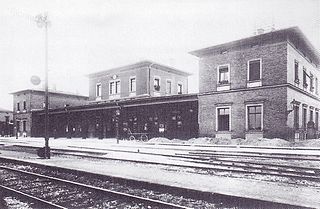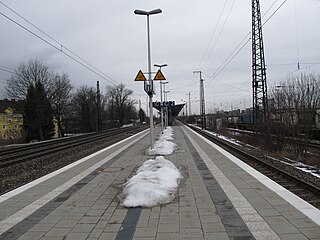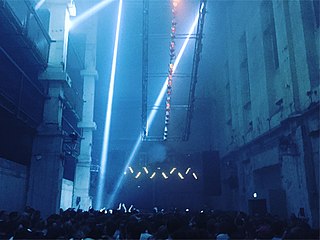
The Munich S-Bahn is an electric rail transit system in Munich, Germany. "S-Bahn" is the German abbreviation for Stadtschnellbahn, and the Munich S-Bahn exhibits characteristics of both rapid transit and commuter rail systems.
The Munich U-Bahn is an electric rail rapid transit network in Munich, Germany. The system began operation in 1971, and is operated by the municipally owned Münchner Verkehrsgesellschaft. The network is integrated into the Münchner Verkehrs- und Tarifverbund and interconnected with the Munich S-Bahn. The U-Bahn currently comprises eight lines, serving 96 stations, and encompassing 103.1 kilometres (64.1 mi) of routes.

München Hauptbahnhof or Munich Central Station is the main railway station in the city of Munich, Germany. It is one of the three stations with long-distance services in Munich, the others being Munich East station and Munich-Pasing station (München-Pasing). München Hauptbahnhof sees about 450,000 passengers a day, which puts it on par with other large stations in Germany, such as Hamburg Hauptbahnhof and Frankfurt (Main) Hauptbahnhof. It is classified by Deutsche Bahn as a category 1 station, one of 21 in Germany and two in Munich, the other being München Ost. The mainline station is a terminal station with 32 platforms. The subterranean S-Bahn with 2 platforms and U-Bahn stations with 6 platforms are through stations.

Sendling-Westpark is the 7th borough of Munich.

Munich East station is a railway station in Munich, the state capital of Bavaria, Germany. It opened as Haidhausen station in 1871 on the new Munich–Mühldorf and Munich–Rosenheim railway lines. The station is operated by DB Station&Service, a subsidiary of Deutsche Bahn AG. It is classified as a Category 1 station, one of 21 in Germany and two in Munich, the other being München Hauptbahnhof. It is the city's third interregional station besides München Hauptbahnhof in the city centre and München-Pasing in the west.

Munich Leuchtenbergring is a railway station on the Munich–Salzburg line in the Bogenhausen quarter of Munich, Germany. It is an elevated station above the Leuchtenbergring, part of Munich's Mittlerer Ring road system. The station serves both the Eastern part of Bogenhausen and the western part of Berg am Laim. It is served by S-Bahn lines , , , and .

Trudering-Riem is the 15th borough (Stadtbezirk) of Munich, Bavaria, consisting of the quarters (Stadtteile) Trudering and Riem. This area is the former location of Munich's old airport, Riem Airport.

München Süd is a disused railway station and a railway goods station in the Munich borough of Ludwigsvorstadt-Isarvorstadt. The train service was withdrawn on 1 July 1985; in 2005 the last buildings were demolished to make room for office buildings.

The Munich tramway is the tramway network for the city of Munich in Germany. Today it is operated by the municipally owned Münchner Verkehrsgesellschaft and is known officially and colloquially as the Tram. Previous operators have included Société Anonyme des Tramways de Munich, the Münchner Trambahn-Aktiengesellschaft, the Städtische Straßenbahnen and the Straßenbahn München.

The Munich–Rosenheim railway is a 65 kilometre-long double-track main line of the German railways. It connects Munich Hauptbahnhof with Rosenheim station, where it connects with the Rosenheim–Salzburg railway, which connects with the line to Vienna at Salzburg, and the line to Kufstein, which continues to Innsbruck and the Brenner line to Italy. The line is part of the "Main line for Europe", connecting Paris with Bratislava and Budapest and the almost identical line 17 of Trans-European Transport Networks (TEN-T). It is part of the line 1 of TEN-T. It is electrified at 15 kV, 16.7 Hz. It was opened between Munich and Rosenheim in 1871.

Munich-Berg am Laim station is a stop on the Munich S-Bahn in the district of Berg am Laim in the Bavarian state capital of Munich. The station is served daily from about 300 services of the Munich S-Bahn each day and is classified by Deutsche Bahn as a category 4 station. It has two platforms tracks and lies on the Munich–Rosenheim railway and the Munich–Mühldorf railway.

The Pfanni GmbH & Co. OHG is a German food manufacturer based in Stavenhagen. It specializes in the manufacturing of kitchen ready potato products. It is a subsidiary of Unilever since 2000.

Union Move was a technoparade that occurred annually in Munich from 1995 to 2001. It was an initiative by Munich event organizers and nightclub owners to demonstrate against the Munich curfew and excessive police controls. A recurring motto of the parade was "Music is the only drug!". The first Union Move took place on 27 May 1995 and attracted 60,000 people. The 1996 parade for the first time attracted 100,000 people, as well as the 1997 parade which involved 16 trucks equipped with sound systems. The next three parades attracted between 60,000 and 70,000 people, but in 2001 attendance declined. The parade usually started at Münchner Freiheit square and continued over Leopoldstraße all the way to Odeonsplatz, and in the first years even further over Isartor to Marienplatz where the final took place. After the final ravers could board a Housetram and this way continue partying through the city. At night the festival was continued at multiple after-parties in the local nightclubs under the motto Night Move. In 2015 an initiative was launched to revive the parade. So far, however, these attempts have not been successful.

The Stammstrecke 2 of the Munich U-Bahn is one of three main routes in the subway network of the Bavarian capital Munich. It runs from north to south, as well as east, and is currently operated by the underground U1 and U2 lines. Since 12 December 2011, the U7 line runs during high traffic times and since 15 December 2013 the U8 line assists on Saturdays. The U1 and U2 lines only run together on one route, in the central inner city area, before and after that, they are branched away from each other. The main line 2 has a total length of 33.8 kilometers and 38 underground stations. It runs exclusively in the city of Munich and completely in the tunnel.

The Bahnwärter Thiel is a techno club, music venue and alternative cultural center in Munich, Germany. It is named after the novella "Bahnwärter Thiel" by German author Gerhart Hauptmann.

MMA Club(Mixed Munich Arts Club) was a techno nightclub in Munich, Germany, renowned as one of the best in Germany in the 2010s. It was a multifaceted establishment based inside the husk of an old thermal power plant and has hosted underground techno DJs such as Richie Hawtin, Adam Beyer, Len Faki, Ben Klock, Marcel Dettmann, Ben Sims or Terence Fixmer, among many others. The maze-like club also contained a 460-square-meter gallery space frequently utilized for a variety of theatrical, artistic and orchestral performances.

Ultraschall was a nightclub in Munich, Germany from 1994 to 2003. The techno club belonged, besides the Tresor and E-Werk in Berlin, the Dorian Gray and Omen in Frankfurt, and the Munich-based clubs KW – Das Heizkraftwerk, Natraj Temple and Millennium, to the most renowned clubs of Germany's 1990s techno culture. According to FazeMag, Ultraschall was "for many techno fans the most authentic techno club alongside the Tresor".

KW – Das Heizkraftwerk was a nightclub in Munich, Germany from 1996 to 2003. The techno club belonged, besides the Tresor and E-Werk in Berlin, the Dorian Gray and Omen in Frankfurt, and the Munich-based clubs Ultraschall, Natraj Temple and Millennium, to the most renowned clubs of Germany's 1990s techno culture.

Natraj Temple [] was a nightclub in Munich, Germany from 1996 to 2008. Germany's first steady psytrance nightclub belonged, besides the Tresor and E-Werk in Berlin, the Dorian Gray and Omen in Frankfurt, and the Munich-based clubs Ultraschall, KW – Das Heizkraftwerk and Millennium, to the most renowned clubs of Germany's 1990s techno culture, and was considered an international centre of the Goa trance movement.

Munich East is an electoral constituency represented in the Bundestag. It elects one member via first-past-the-post voting. Under the current constituency numbering system, it is designated as constituency 218. It is located in southern Bavaria, comprising the eastern part of the city of Munich.





















